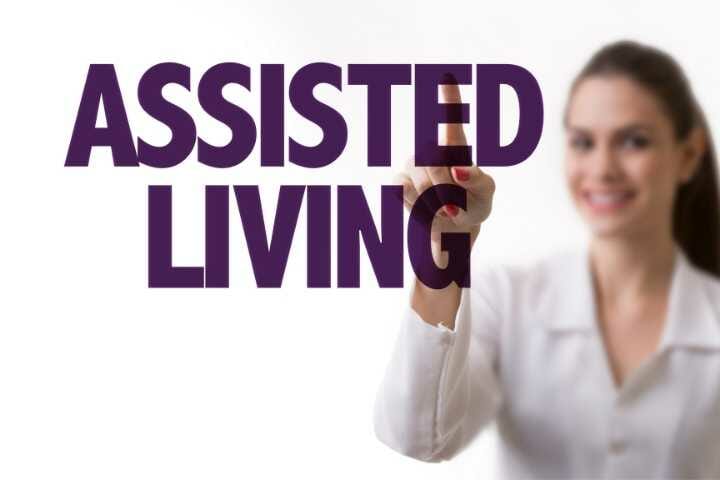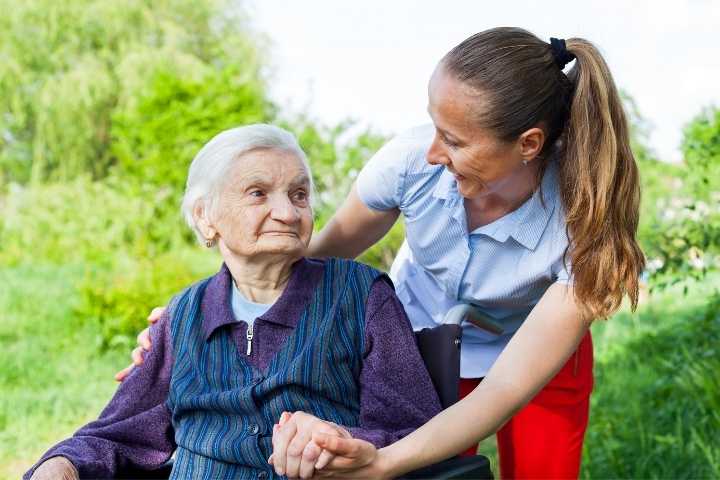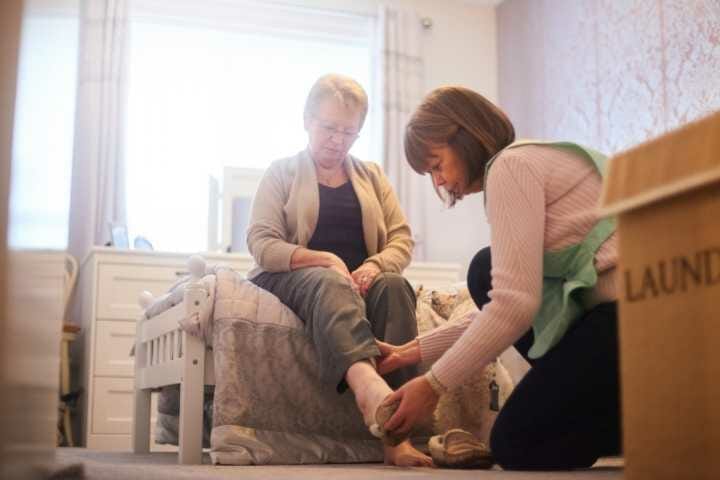Moving your loved ones to assisted living can be a painful experience. We give below a guide to transitioning your loved one to an assisted living facility.
Contents
Many seniors need more care than others with growing age. Their family caregivers may not be able to provide enough attention and care due to their busy lives.
Some of your loved ones start losing memory and develop other degenerative conditions that make it difficult for both families and caregivers to handle.
The doctor may advise taking long-term care of seniors with Dementia or Alzheimer’s by moving them to a senior care facility. In such cases, you must prepare the older adult to transition to an assisted living facility.

In this guide, you can learn the best tips that help to make the transition easy for you and your loved one. We have taken suggestions from seniors care facility administrators, caregivers, dementia or Alzheimer’s experts, and people with senior care experience to prepare the tips that we are sharing below.
Choosing The Right Hospice Care
Before moving your senior loved ones to a care facility, you need to research the facility and its services to ensure that hospice care is the right choice. Have an honest discussion with your senior adult first and understand their personality and needs.
Experts at ASCSSeniorCare advise people to learn more about the policies, procedures, and treatments, and other features available for seniors in the community. You also need to know the strength of security at a care facility.
Research about different care facilities and their background, ask from experienced people or gather information online. After completing the analysis, choose the right senior living home that provides your loved one with the best quality of life.
Here are some questions that you should ask before making any final decision:
Services Provided
- Ask for a list of services from the care facility.
- Does the facility provide service to a family caregiver or professional caregiver as well?
- Is there a list of services that hospice volunteers provide?
- Are there any after-hours services available in case of emergencies?
- What facilities are provided to make the resident comfortable?
Availability Of Medical Help
- What are the boundaries, roles and responsibilities, and distinctions between the resident physician at the hospice vs. your own personal physician?
- Does the facility have an in-patient care option on-premises, and what all can be treated there?
- What LTC facilities and nursing homes do the hospice collaborate with?
Efficiency
- If you choose to take up their services, how long will it take for the facility to make arrangements to accept your senior adult?

Easing Transition To Assisted Living
The procedure of moving to a new senior living community is not easy for both you and your loved one. To ease the transition to assisted living, follow these tips as guidelines for preparing to move you or your loved one to an assisted living facility.
Don’t carry everything with you.
According to experts, when preparing for the transition to assisted living, you should pack and carry as few items as possible because you really won’t need everything you think you do. Many seniors bring too many belongings that they don’t need.
Older people with memory loss often forget to pack essential things. When packing for your loved ones, don’t include them. However, observe your loved ones and understand what they need most. What do they enjoy doing during their day and night? Do not forget to carry the most important things that they use every day.
One more piece of advice when packing for seniors with memory loss is to pack fewer clothing options. Too many options can confuse a person with dementia or Alzheimer’s and even frustrate them.
Work with managers/counselors.
It is difficult for a family member to move a loved parent or elder into a care facility. However, you can get help from professionals such as managers or counselors who support you, and your loved one is doing the work required for the transition.
They assure the family that the person will move safely on the day of transition. You and other caregivers can ask these professionals as many questions as you want about the program.
Clear any doubts before the transition and receive full knowledge from the manager. Knowing about transitioning your loved one will help you face it.

Schedule the moving time with the best time of the day of your loved one
According to a senior living expert, aligning the moving time of your loved one with their best time of day is a good idea. It helps the person and family to accept the transition easily.
If your loved one is at their best in the morning and worst during the evening, then plan the move into assisted living early in the morning.
Observe the mood of your loved one for a few days and plan the arrival at the care facility based on their best time of day. It will help you and your loved one settle comfortably during moving to senior living care.
Get your seniors accustomed to the facility before moving in.
You should take your loved ones to the assisted living facility and help them get familiar with the place and the staff. You can also ask for the team to make a few special arrangements that your loved one needs in the home before they move in.
Try encouraging your older adult to become involved with some of the games and social engagements provided at the facility, and help them meet other residents so that they can make a few friends and be comfortable with the place before going there.
Caregivers advise patients with Alzheimer’s disease to visit the care facility as frequently as possible because it provides dementia patients with a sense of familiarity and comfort with the place. It helps the person feel comfortable around the staff.

Familiarize The Staff With Your Loved One’s Stories.
If your loved one is moving to memory care, you can help the staff by sharing their stories, likes, dislikes, and passions. By sharing such details, caregivers and staff will be able to offer a bit of extra help and support to the older adult that you are transitioning there.
They will be able to find other residents who have similar likes and dislikes and match them to your loved one so that they can feel comfortable and talk about shared experiences (for example, if your loved one is a veteran, then they might introduce them to other veterans at the facility).
When seniors have someone to share their stories, hobbies, and thoughts with, it makes the transition to assisted living much more effortless.
Ask healthcare professionals for help in explaining to your loved one the situation.
A person of sound mind can make their own decision as they find best for them. However, older people often experience memory and judgment impairment, so the family member has to take action and decide what is best for their loved one.
But telling your loved one directly about the decision is inappropriate and may be difficult for you. You can rely on the healthcare profession for help when you need to explain the need for memory care for your loved one.
Healthcare professionals or doctors help you explain to your loved one and other family members calmly and professionally.

Take advantage of care facilities that offer transition programs.
Many assisted living homes to provide transition programs and emergency medical services to seniors. If your loved one or parents need a nursing home environment, a transition program can quickly provide it.
To know more about the transition program, ask the manager or staff of the facility about the program. The senior living facility designs a nursing home where your loved one can adjust and live without needing your presence. It also helps you or your loved one in independent living.
Advice for Family Members
When the whole family agrees to send their loved one to an assisted living community, there are some things that family members need to follow.
Take a few days off to be available before the moving day.
Prepare your leave from work on a moving day. You need to present as your loved one or parent feel easy when a family member is around. You should plan the time off in advance because it might be difficult to take off if it’s done on short notice.
You should save some holidays or paid leave for when your parents move. Arrange a family member or a friend beforehand to take care of your children/pets when you are making the transition.
Also, you should save some money that you may need to pay for the care home’s first-month rent and any other extra services that the memory loss patient may need.

Don’t stress them out by talking about moving ahead of time.
Experts advise avoiding any early moving announcement of your parent or loved one as it causes anticipation anxiety in the person. It is better to wait until the moving date is closed and inform seniors just before the transition.
The stress from being moved can cause negative sentiments that can also result in behavioral change. With short notice, seniors’ minds stay calm and ease in the transition.
Remember, it will get easier.
Transition is not easy for a family as they have to distance a family member from them. It may seem hard, but it eventually gets better and more accessible. The person with dementia will get the attention and care they need from the memory care community.
The person will get used to their new home and feel comfortable and safe at their new home. If you decide to move your parents to memory care, remember that you made the correct choice for both you and your parents according to your situation.
Visit regularly to make it easier.
It would be best if you made regular visits to the assisted living center to help the moved person adjust to their new home. Remember to visit your loved one or your parents throughout the first few weeks of transition.
However, you should call for a limited time to balance and help people with dementia live independently in your absence. Try discussing the best days and times to see your loved one with the staff.

Be prepared to hear complaints.
If your older adult is unhappy with something at the care center, you should write it down. You may also hear some complaints so you should prepare for it. You can figure out and tell your loved one the advantages of nursing homes from a patient’s point of view. You can work on your loved one’s complaints and make their new home better.
Give your loved one time to adjust in your absence.
You may want to spend all your remaining time with your loved one. However, you should give some alone time to your loved ones so they can adjust on their own. You can give your loved one time to participate in activities and make new friends at the care center.
It would be best if you visited them regularly but not daily. Give them some time to adjust to their new home and adapt to new things. Instead of meeting your loved one, ask the staff about their wellbeing.

Remain positive
Senior living experts advise you to remain positive with an upbeat attitude. It is common for a person to feel anxious, but if you constantly seem worried and fretting, the person moving to memory care will feel the same.
So, it is crucial to stay positive during the whole moving time. You can try pointing out the benefits and positive outcomes of the new community. You should encourage your loved one by giving exciting facts about the transition.
Use compassionate deception
When your loved one is not easy to convince for transition, you can use a helpful method for transition. The technique called compassionate deception that you can use to convince your parents or your loved one to go to memory care for a limited time, usually for a week.
Using this method to stretch out the period by two weeks then three weeks, eventually making it full time. It helps the dementia patient to adjust and help forget about their old home. Patients with an impairment will believe that they are at home.
Aid And Attendance
Aid and Attendance is a financial aid program for veteran seniors. Seniors with or without their spouses can benefit from the Aid and Attendance and receive the payment for the assistance they require for their daily living tasks.
The aid helps seniors in everyday functioning such as eating, dressing, bathing, reminding medication are other care-related services.

The eligibility requirement for this pension includes age and period of military service. Seniors with the age of 65 are eligible for veterans pensions.
People with disability status can also get assistance. However, to avail Aid and Attendance benefits, the senior must show the requirement of help in daily living activities at home or assisted living.
Wrap Up
You should take several steps to prepare once you and your loved one have decided to transition to assisted living. The tips from this guide for seniors and caregivers will help you according to your loved one’s personality and needs.
We advise everyone to choose the right community for themselves by using the methods that we described above.

We hope the article will help your loved one make a smooth transition into assisted living. If you have some tips and tricks that you used for your own senior parents’ move, please share with us in the comments section so that it might benefit others who are in need of such advice.
As always, if you found the content useful, make sure to share it with others who are in need of similar advice and knowledge. And do give us a shoutout on your social media page if you loved the content.
